Translation in English (GPT):
Janakpur Dham, Nepali people who go to India constantly face harassment by the Indian Border Security Force (SSB) in the border areas. Recently, it has been revealed that the SSB also exerts pressure on Nepali women for sexual relations.
Many residents of the border areas of Nepal are dependent on Indian markets for household shopping. Even for buying a liter of kerosene or a packet of salt, they have to go to Indian markets. The fact that SSB harasses women going for shopping has become public.
Sunitha (name changed), a 30-year-old from Bariyarpatti Rural Municipality-4, had gone to Ladaniya Market (India) four days ago to buy kitchen-related items. She was stopped by an SSB personnel while returning with the items. They offered her money for keeping the items and when she refused, they beat her up and accused her of smuggling.
"I was returning with goods in a plastic bag," she told a Nepali press, "When the SSB put a barrier at the border, they stopped me. One SSB personnel told me to put the goods down. I kept the goods on the ground and said, 'I have only a few items, I am poor, please let me go.' After that, he asked me in his language, 'Will you give?' I refused."
After rejecting the sexual proposal, the SSB personnel threatened Sunitha to confiscate the goods. She narrated, "I didn't agree. Then he hit me with two sticks on my head and asked me to leave. I got scared and started moving towards home."
The SSB personnel not only threatened Sunitha but also made sexual advances towards other women bringing goods from Ladaniya Market. Similarly, in Gaunpalika-2, Sakina (name changed) also reported that an SSB personnel made sexual advances towards her while she was returning from Ladaniya Market.
Sakina's husband is in jail. Being from a poor family, she faces problems managing the household. Therefore, she purchases kitchen-related items from Ladaniya Market at a low cost. Two days ago, SSB personnel made sexual advances towards her and now she refuses to go to the Indian market.
"I was returning with a woman from our village after purchasing salt, oil, chili, etc from Ladaniya," she said, "The SSB stopped her at the border. Another woman told them that my husband is in jail and sometimes they come to buy household items. She expected after hearing this, the SSB would let her go. However, they made sexual advances."
"Your husband is in jail. My wife is also far away. Let's go and have fun in the fields" Sakina heard from an SSB personnel. After she said that there are small children at home, her in-laws are there, they will kick her out if she did, the SSB personnel chased her away.
The soldiers of SSB Battalion 18 stationed at Ladaniya in Madhubani district of Bihar also engage in sexual misconduct towards Nepali women. However, it has been reported that the main officer Gandhi Ram makes sexual advances towards women returning after shopping, but no action has been taken on this matter and he continues behaving inappropriately.
Chief District Officer of Siraha Vasudev Dahal received information about misconduct towards women when they return from India after shopping at Bariyarpatti border.
He said, "There is no mention of sexual advances being made. However, cases of misconduct have been reported. There will be a meeting on Falgun 11 in Madhubani. I will address this issue there."

